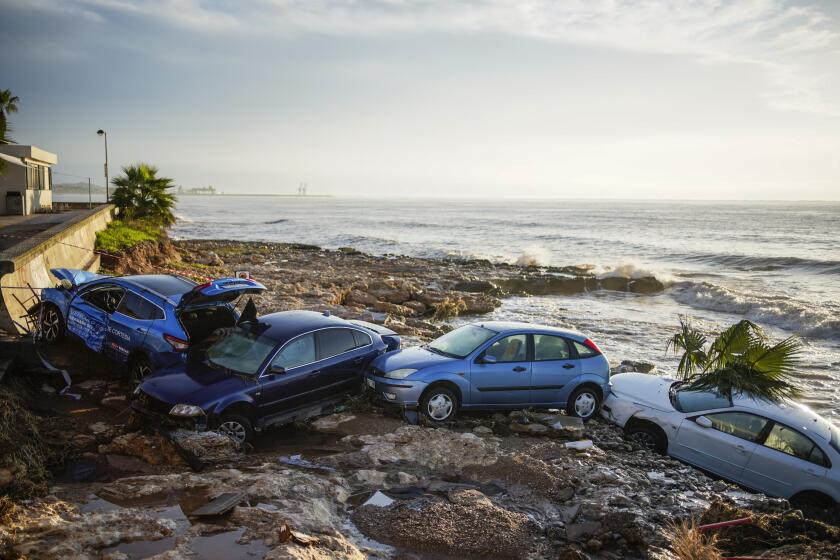A week after Spain’s floods, families hold out hope that loved ones are not among the dead

- Share via
SEDAVI, Spain — Francisco Murgui went out to try to salvage his motorbike when the water started to rise.
He never came back.
One week after catastrophic flooding devastated eastern Spain, María Murgui still holds out hope that her father is alive and among the unknown number who are missing.
“He was like many people in town who went out to get their car or motorbike to safety,” the 27-year-old told the Associated Press. “The flash flood caught him outside, and he had to cling to a tree in order to escape drowning. He called us to tell us he was fine, that we shouldn’t worry.”
But when she set out into the streets of Sedaví to try to rescue him from the water washing away everything in its path, he was nowhere to be found.
A crowd of angry survivors of Spain’s floods tossed mud and shouted insults at Spain’s King Felipe VI and government officials as they visited hard-hit towns.
“He held up until 1 in the morning,” she said. “By 2, I went outside with a neighbor and a rope to try to locate him. But we couldn’t find him. And since then, we haven’t heard anything about him.”
At least 218 have been confirmed dead after heavy rains late on Oct. 29 and the next morning swamped entire communities, mostly in Spain’s Valencia region. Most people were caught off guard. Regional authorities have been heavily criticized for having issued alerts to cellphones some two hours after the disaster had started.
Authorities have yet to any give an estimate of the missing. Spanish state broadcaster RTVE shows a steady stream of appeals by people searching for family members.
María Murgui has posted a missing person’s message on social media with a photo of her father, a 57-year-old retiree.
“This is like riding a roller-coaster. Sometimes I feel very bad and sometimes I feel better. I try to stay positive,” she said. “This truly is madness. We don’t know what else to do. Neither does anybody else in town.”
Crews are searching for bodies in stranded cars and sodden buildings as people try to salvage what they can from ruined homes following flash floods.
Central government passes relief package
While many search for their loved ones, the gargantuan recovery efforts in Sedaví and dozens of other communities slowly moved forward.
The central government approved an $11.5-billion relief package for 78 communities on Tuesday. Prime Minister Pedro Sánchez compared it to the measures taken during the COVID-19 pandemic.
The package includes direct payments of about $21,700 to $65,100 to owners of damaged homes, and financial aid for businesses and municipal governments.
“We have a lot of work left to do, and we know it,” Sánchez said.
Sánchez said he will ask the European Union to help pay for the relief, saying “it is time for the European Union to help.”
Crews are searching for bodies in stranded cars and sodden buildings as people try to salvage what they can from ruined homes following flash floods.
Many people are still without basic goods amid scenes of devastation
The floods have left behind postapocalyptic scenes.
In town after town, streets are still covered with thick brown mud and mounds of ruined belongings, clumps of rotting vegetation and wrecked vehicles. A stench arises from the muck.
In many places, people still face shortages of basic goods, and lines form at impromptu emergency kitchens and stands handing out food. Water is running again but authorities say it is not fit for drinking.
The ground floors of thousands of homes have been ruined. There could be bodies waiting to be recovered inside some of the vehicles that were washed away or trapped in underground garages.
Many Spaniards are counting their losses and damage to homes and businesses caused by flooding produced by intense rain that continued falling over large areas of the country.
Thousands of soldiers are working with firefighters and police reinforcements in the immense emergency response. Officers and troops are searching in destroyed homes, and in the countless cars strewn across highways and streets or lodged in the mud in canals and gorges.
Authorities are worried about other health problems in the aftermath of the deadliest natural disaster in Spain’s recent history. They have urged people to get tetanus shots, to treat any wounds to prevent infections and to clean the mud from their skin. Many people wear masks.
Thousands of volunteers are helping out, but frustration over the crisis management boiled over on Sunday when a crowd in hard-hit Paiporta hurled mud and other objects at Spain’s royals, Sánchez and regional officials when they made their first visit to the epicenter of the flood damage.
Muñoz and Wilson write for the Associated Press. Wilson reported from Barcelona, Spain.
More to Read
Sign up for Essential California
The most important California stories and recommendations in your inbox every morning.
You may occasionally receive promotional content from the Los Angeles Times.













